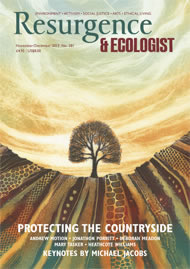Look at any contemporary poetry forum or Facebook page for long enough, and you’ll find an agonised debate starting up about how the art form can make itself more relevant, or accessible, or both. Solutions offered will inevitably involve the internet and live performances. But it’s rare to see anyone suggest a simple but effective tweak to the standard formula of publishing 50–60 pages of poems in a single author collection.
That’s what Ruth Padel has done here, though, weaving poems on the theme of migration in and out of her reflective but scientifically precise prose on the same subject. She describes the latter as the equivalent of the introductions she’d give the poems at a reading, and certainly they have the effect of giving the casual reader multiple ways into each poem.
If that’s all they were, there’d be a danger of it all sounding like a well-meaning but slightly patronising lecture. Fortunately, these mini-essays go beyond that, foreshadowing the poems to come and echoing those just gone, providing clear context for a sometimes intimidating art form, and sending you off to find out more about the subjects of the poems.
This helps counter the criticism often levelled at both poetry and Nature writing – that they ‘make nothing happen’ and serve only as a form of consolation or conscience-salve for readers far removed from contemporary issues.
Now and then, too, Padel allows her lyricism to infuse the prose. There’s a passage early on in which she encounters a red kite, where “cells got muddled up in my mind with what they sound like – souls”. From there she moves on to how birds have traditionally been used as images of the soul. It’s an important moment because as much as anything it’s a reflection on how the best poetry works, making sudden, instinctive connections between disparate subjects.
The poems themselves are in a style familiar to anyone who has enjoyed Padel’s work in the past. Her rhythms are subtle but insistent, her use of rhyme similarly understated but assured, and her pacing surefooted. One thing she really excels at is bringing out the music in scientific language. Passages such as “In a blitz of lamellipodia, Cell | sprouts her motile fronds. She, the queen bee | will fibrillate each organelle | in turn” are as much a pleasure for the sounds they make as for the sense conveyed, and that as much as anything else serves to open up new ways into the subject matter and poetry for the casual reader.
Padel’s subject is far wider than merely the migrations of birds, mammals, fish and so on. What she makes clear from the outset is that migration is one of the primary forces that have shaped all life and history on this planet; and it’s when she weaves human stories into her work that this book is at its most affecting.
From biblical journeys, through the travels of pioneer naturalists such as John James Audubon, to the present-day odysseys of migrant workers, Padel is always clear that the urge to move on is within every living thing on Earth, and that attempting to understand it is a good deal more complicated than politicians or journalists would have you believe.
This insistence – that we are all, in the end, migrants – means there’s a universality to her poetry that works hand in hand with the inclusiveness of the book’s unusual format. And this is never more in evidence than during the closing poems. Open Door asserts “What is not exile? Beginning is flight”, before Time to Fly brings together all that has gone before in one superb coda:
You go because hope, need and escape
are names for the same god. You go
because life is sweet, life is cheap, life is flux
and you can’t take it with you. You go because you’re alive,
because you’re dying, maybe dead already. You go because
you must.
It’s poetry with a purpose, but it’s also poetry that says what can’t quite be grasped in prose, which is to say it’s what true poetry must always aspire to.
Matthew Merritt is a poet and Editor of Bird Watching magazine. www.birdwatching.co.uk








